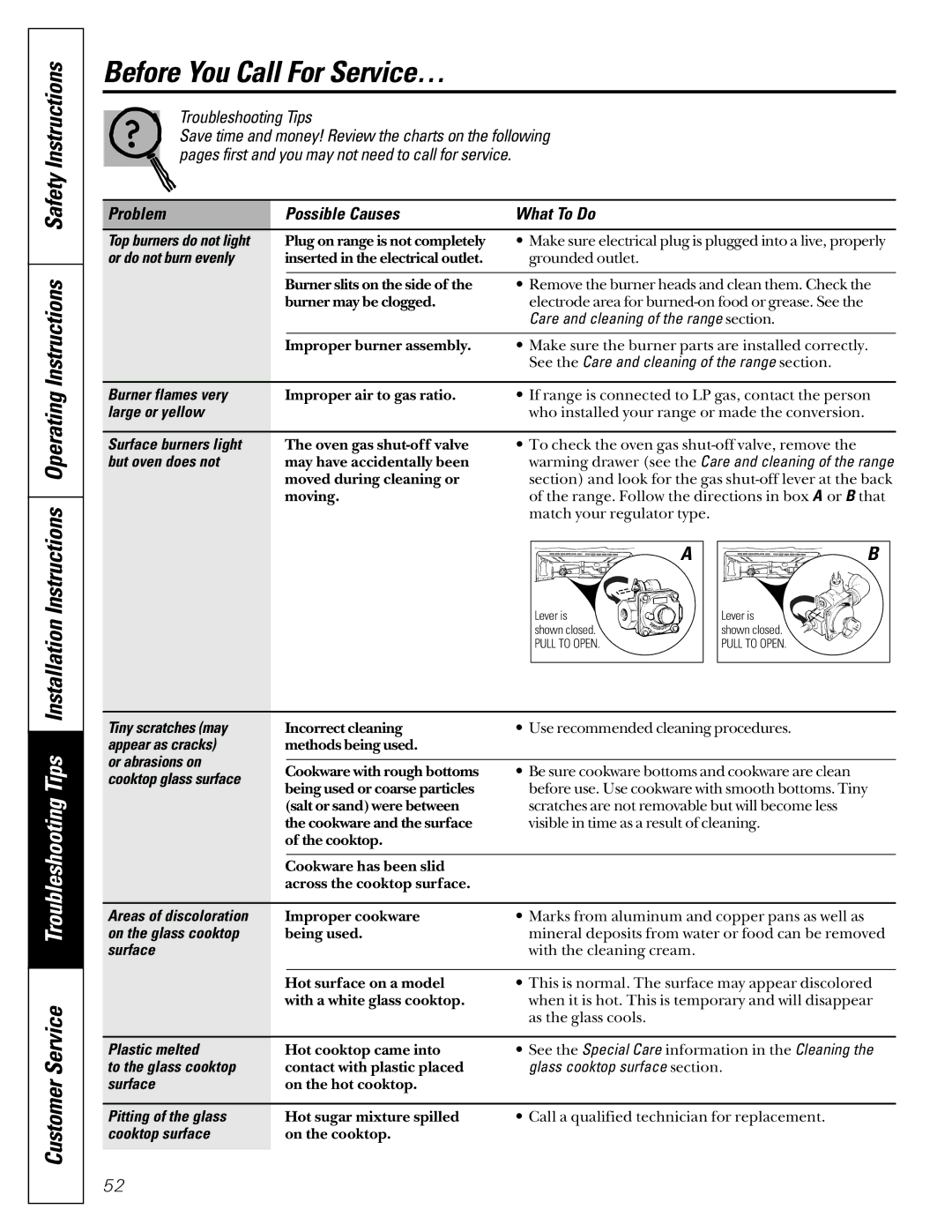
Operating Instructions Safety Instructions
Before You Call For Service…
Troubleshooting Tips
Save time and money! Review the charts on the following pages first and you may not need to call for service.
Problem |
| Possible Causes | What To Do | |
|
|
|
|
|
Top burners do not light |
| Plug on range is not completely | • Make sure electrical plug is plugged into a live, properly | |
or do not burn evenly |
| inserted in the electrical outlet. | grounded outlet. | |
|
|
|
|
|
|
| Burner slits on the side of the | • Remove the burner heads and clean them. Check the | |
|
| burner may be clogged. | electrode area for | |
|
|
|
| Care and cleaning of the range section. |
|
|
|
|
|
|
| Improper burner assembly. | • Make sure the burner parts are installed correctly. | |
|
|
|
| See the Care and cleaning of the range section. |
|
|
|
| |
Burner flames very |
| Improper air to gas ratio. | • If range is connected to LP gas, contact the person | |
large or yellow |
|
|
| who installed your range or made the conversion. |
|
|
|
| |
Surface burners light |
| The oven gas | • To check the oven gas | |
but oven does not |
| may have accidentally been | warming drawer (see the Care and cleaning of the range | |
|
| moved during cleaning or | section) and look for the gas | |
|
| moving. | of the range. Follow the directions in box A or B that | |
|
|
|
| match your regulator type. |
Installation Instructions
A |
Lever is |
shown closed. |
PULL TO OPEN. |
B |
Lever is |
shown closed. |
PULL TO OPEN. |
Troubleshooting Tips
Customer Service
Tiny scratches (may | Incorrect cleaning | • Use recommended cleaning procedures. | ||
appear as cracks) | methods being used. |
| ||
or abrasions on |
|
|
| |
Cookware with rough bottoms | • Be sure cookware bottoms and cookware are clean | |||
cooktop glass surface | ||||
being used or coarse particles | before use. Use cookware with smooth bottoms. Tiny | |||
| ||||
| (salt or sand) were between | scratches are not removable but will become less | ||
| the cookware and the surface | visible in time as a result of cleaning. | ||
| of the cooktop. |
| ||
|
|
| ||
| Cookware has been slid |
| ||
| across the cooktop surface. |
| ||
|
|
| ||
Areas of discoloration | Improper cookware | • Marks from aluminum and copper pans as well as | ||
on the glass cooktop | being used. | mineral deposits from water or food can be removed | ||
surface |
|
| with the cleaning cream. | |
|
|
|
| |
| Hot surface on a model | • This is normal. The surface may appear discolored | ||
| with a white glass cooktop. | when it is hot. This is temporary and will disappear | ||
|
|
| as the glass cools. | |
|
|
| ||
Plastic melted | Hot cooktop came into | • See the Special Care information in the Cleaning the | ||
to the glass cooktop | contact with plastic placed | glass cooktop surface section. | ||
surface | on the hot cooktop. |
| ||
|
|
| ||
Pitting of the glass | Hot sugar mixture spilled | • Call a qualified technician for replacement. | ||
cooktop surface | on the cooktop. |
| ||
52
